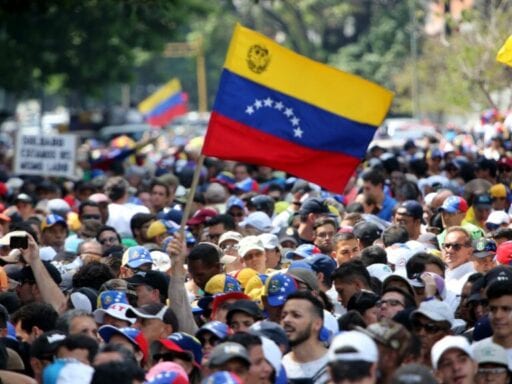Vox Sentences is your daily digest for what’s happening in the world. Sign up for the Vox Sentences newsletter, delivered straight to your inbox Monday through Friday, or view the Vox Sentences archive for past editions.
The highest sports court upholds a controversial ruling affecting female athletes; Guaidó calls for an armed uprising in Venezuela.
Female athletes must regulate their hormone levels, court rules
/cdn.vox-cdn.com/uploads/chorus_asset/file/16205615/5.1.jpg) Lukas Schulze/Getty Images for IAAF
Lukas Schulze/Getty Images for IAAF- The Court of Arbitration for Sport, the highest court governing international sports, ruled that women with high levels of testosterone must take hormone-suppressing drugs in order to compete in some international races. [Rolling Stone / E.J. Dickson]
- Caster Semenya, a South African athlete and two-time Olympic champion, challenged restrictions on women who have higher levels of testosterone. The court, however, did not side with her and ruled that she would have to lower her testosterone levels if she wanted to compete in the 2020 Tokyo Olympics 800-meter race. [NYT / Jeré Longman]
- A three-judge panel said in the ruling that these restrictions are discriminatory but necessary for “preserving the integrity of female athletics.” [BuzzFeed News / Mary Ann Georgantopoulos]
- The ruling is a blow to Semenya, who has long argued such regulations target her specifically. [USA Today / Nancy Armour]
- There are also concerns regarding the health issues that accompany hormone-suppressing drugs. Athletes forced to take such drugs would have to endure the possible side effects if they wanted to compete in prestigious international competitions. [Guardian / Sean Ingle]
- The South African government decried the ruling as an insult to the “human rights and dignity” of Semenya and other athletes. But the International Olympic Committee has said it is working to create regulations that are more inclusive. [CNN / Aimee Lewis and Eoghan Macguire]
Violence and uncertainty in Venezuela
- Violence in Venezuela has escalated as opposition leader Juan Guaidó called for the “final phase” of President Nicolás Maduro’s removal: an armed uprising. [BBC]
- Guaidó’s bold call for an uprising was delivered via video Tuesday morning, and the opposition leader was seen flanked by members of the Venezuelan National Guard. Since his announcement, citizens of Venezuela have poured into the streets, and while these demonstrations aren’t new, the clashes are increasingly violent, with both sides armed. [NYT / Megan Specia]
- So far, about 52 people have been injured as the protests continue into Wednesday. Maduro isn’t budging, though, and has threatened to punish those who attempt to overthrow him. [AP / Scott Smith and Joshua Goodman]
- The conflict between Guaidó and Maduro has been ongoing since January, when Guaidó — who is next in line for succession as the head of the National Assembly — declared himself the interim president after accusing Maduro of rigging the elections last May. [CNBC / Amanda Macias and Fred Imbert]
- Most of the country’s citizens and the governments of more than 50 countries have backed Guaidó’s rule. The US has been vocal of its support for Guaidó, and Secretary of State Mike Pompeo said US intervention is a possibility in the wake of the violent protests. [CNN / Jennifer Hansler and Karl de Vries]
- For Guaidó to win, however, he will need the support of the country’s military, which mostly remains loyal to Maduro for now. Without their firearms, overthrowing Maduro may be impossible. [Reuters / Vivian Sequera, Angus Berwick, and Luc Cohen]
- The future remains uncertain in a country that has been suffering from a deep recession since 2014. What is clear is that Guaidó is pushing to fracture the regime in the hope that Maduro will finally concede. [Vox / Alex Ward]
Miscellaneous
- A hospice patient thought she was going to watch the Battle of Winterfell as part of her last wish. The cast of Game of Thrones surpassed her expectations. [CNN / Mallory Hughes]
- Empire is being renewed for a sixth season, but it’s unlikely that Jussie Smollett will be returning. [Fox / Julius Young]
- Instagram used to be a place for food pictures and selfies. The company is now transforming it into a space for business, as users can now sell products directly on the platform. [Atlantic / Taylor Lorenz]
- Swarthmore College students were horrified when leaked fraternity documents showed members referencing a “rape attic” and using misogynist and racist language — so they protested. Four days later, both on-campus fraternities disbanded. [The Cut / Hannah Gold]
- People in nursing homes often crave social interaction. Some in the tech world think robots might be the cure for their loneliness. [Daily Beast / Joelle Renstrom]
Verbatim
“I just want to run naturally, the way I was born. It is not fair that I am told I must change. It is not fair that people question who I am. I am Mokgadi Caster Semenya. I am a woman and I am fast.” [Olympian Caster Semenya’s response to the ruling that she must use hormone-suppressing drugs in order to compete in races]
Listen to this: Today, Explained — “Bovine Intervention”
Burger King announced it’s going nationwide with a meatless Whopper that tastes like the real thing. Is this the end for Big Meat? [Spotify]
Read more
Silicon Valley is awash in Chinese and Saudi cash — and no one is paying attention (except Trump)
SpongeBob SquarePants’ 20 years of brilliance, explained in 3 episodes
Facebook’s dating app will let you list your secret crushes
Workers in Mexico just won the right to organize real labor unions. Trump helped.
Author: Catherine Kim
Read More



